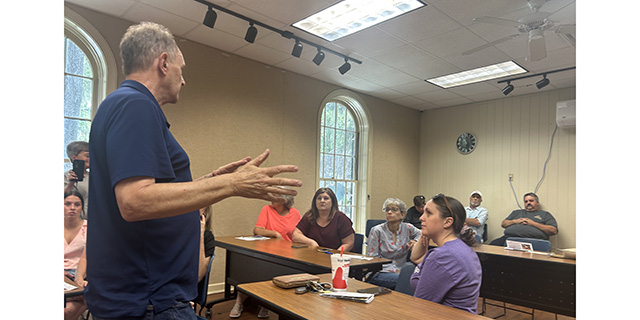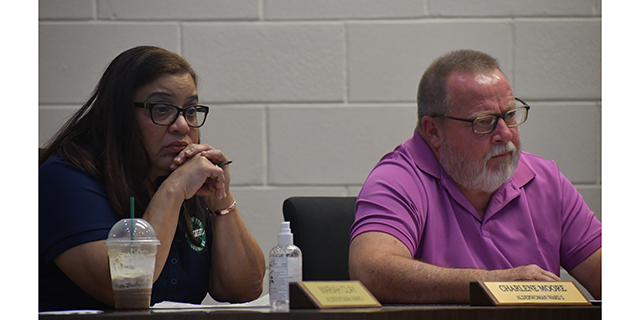Change on streets in first 30 days
Published 8:00 am Thursday, December 27, 2018

- This convenience store on the 1000 block of Mississippi Street serves as a hub for the surrounding community. It also has attracted criminal activity. The current owner said he wants to work with police, but it isn’t easy.
It’s safe to say that Michael Manes knows New Iberia.
His family has owned businesses and homes in the Weeks Street area since the 1940s. He renovated the family’s former general store as his home, where he lives today.
“We moved back to New Iberia in 2004, and moved into the store in ’06,” Manes said Wednesday afternoon.
When he returned, Manes said it was much as he remembered. But in recent years, that changed.
“I would talk with friends on the phone to try to tell where the gunshots were coming from,” he said. “It was a regular event. Every night we would hear shots.”
It was disheartening, Manes said.
“My mother lived in this block for more than 50 years,” he said. “In all that time, she only had someone break in once, while she was out. They stole a jar full of change.”
Then, as suddenly as it had come, the gunfire nearly stopped.
“Within 30 days of the New Iberia Police opening back up, there were very few gunshots,” he said. “It went from every night to once a week, if then.”
The apocryphal tale is one that has been crossing the streets of New Iberia for months, albeit quietly. It’s almost as if most people are afraid to say that normalcy may be returning for fear of jinxing it.
Turning a corner
For years, the refrain from the Iberia Parish Sheriff’s Office has been the reason crimes in New Iberia were not being solved was that residents would not step up to identify suspects. Now, the community is starting to respond.
“We still get some uncooperative victims from shootings,” New Iberia Police Chief Todd D’Albor said Wednesday afternoon. “Sometimes it is because they have involved themselves in illegal activity. But we are trying to change that.”
It is a noble, but challenging, goal. And the public perception that kept residents from getting involved has been years in the making. The federal investigation that led to charges against Iberia Parish Sheriff Louis Ackal and felony convictions against almost a dozen of his deputies was the culmination of years of abuse from parts of the IPSO, largely aimed at the black community in New Iberia’s West End neighborhoods.
Aside from testimony detailing beatings and intimidation against civilians and inmates that came out of the federal trial, scores of civil lawsuits still are making their way through state and federal courts claiming abuse and neglect at the hands of IPSO officials.
Even before that, the incidents of abuse at of IPSO deputies at the Brown Sugar party on Hopkins Street in 2013 fractured any chance deputies may have had to gain trust in the neighborhood, many say.
D’Albor is the first to admit crime is not going to go away. But he does say his fledgling police department is bringing some semblance of trust back to city residents.
The early numbers are promising. In the first six months of 2018, the Iberia Parish Sheriff’s Office reported nine homicides in the parish — eight of them in New Iberia, and four of those unsolved. In the last six months of the year, there have been two homicides in the city limits, both solved.
The nightly shootings that kept Manes and his neighbors guessing also have dropped.
D’Albor said his department has had 14 shootings reported in the last six months. Of those, eight have been solved. Of the four stabbings that have been reported, D’Albor said three have been solved. Three reported rapes also have suspects behind bars.
He credits the efforts of New Iberia Mayor Freddie DeCourt to be open with the community and his own actions to hold his police officers accountable for the resurgent trust.
“Hopefully we can get at least 65 percent of the people in the community to help,” D’Albor said. “This is what is happening now. We were able to solve the last homicide with help from the community.”
Changing a culture
At the dead end of Mississippi Street, one of the city’s highest crime areas, the new owner of the former B&B Grocery said he is willing to work with police, but it is not easy.
Ameer “JoJo” Hussein would not allow any photos inside the store. As he worked the register, a steady stream of customers came through, each bellying up to the counter with a dollar bill to purchase a single Black and Mild cigar — the preferred wrap for blunts, cigars that are emptied and repacked with marijuana or other narcotics.
“They told me they wanted me to work with them,” Hussein said of the incoming police department. “They wanted me to clear the trees, to cut the grass and clean the parking lot. I put up cameras. I put up signs to say no loitering.”
That was before Hussein said one of his employees was caught outside the store smoking narcotics.
“He had less than an ounce on him,” he said. “They got a search warrant and came inside my store. I said, ‘I risk my life if I help work with you.’”
Outside the store, the scene changes throughout the day. A few people hang about, smoking, one man chattering to whoever passes within ears’ reach. Customers walk in and out of the store from the subsidized housing complex across the street, or from the mobile homes farther up Mississippi Street.
But the poverty is there, hanging on the dust as another storm from moves in. Like the impending rain, the fight the city cannot avoid is not against the trust issue, or crime itself, but the combination of economic hardship and social decay that envelopes some of its older, poorer areas.
“It’s a cultural problem,” Manes said. “It’s not a race problem. It’s not a ‘SugarTown’ issue. It’s the collapse of the family unit that causes this.”
The larger issues are not going away, but D’Albor said that he thinks his department is helping to turn the ship, even if it is a wide slow turn at first.
“It is getting better,” D’Albor said. “This is the answer. Using community policing, making a U-turn from the past. We need to look forward, because we are moving in the right direction already, and I feel good about that direction.”
FRIDAY: How the administration is banking on NIPD’s success to help spark more growth for the city and its residents.





